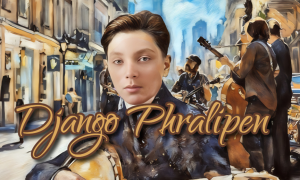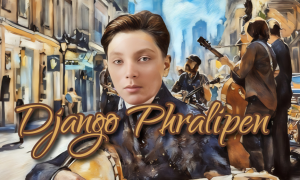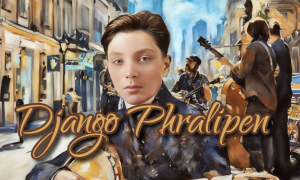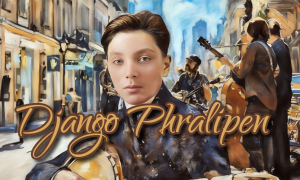Home » Jazz Articles » Django's Cosmic Echo » Chapter One: The Dam Square Shuffle
Chapter One: The Dam Square Shuffle
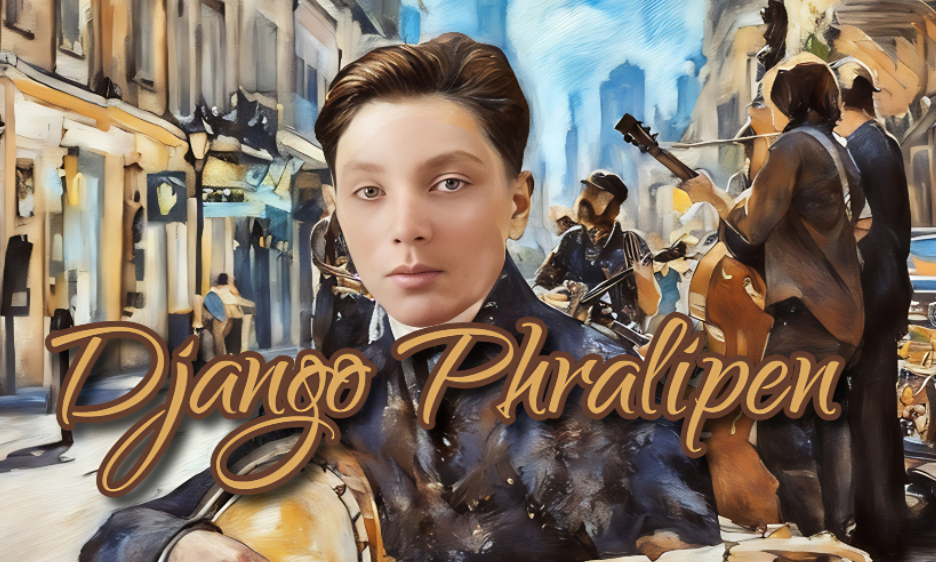
Courtesy AI
Django Reinhardt
guitar1910 - 1953
He awoke sprawled on a park bench, the unforgiving planks of some alien city pressing into his back. Amsterdam, 1967. Not that he knew the year, or the name of this modern nightmare. He squeezed his eyes shut, then forced them open again, praying the impossible vista before him—the roaring metal beasts, the strangely clad people, the unfamiliar structures—would dissolve. It didn't. This was no dream, yet his mind screamed denial.
Men with hair longer than his Naguine's, women in skirts that barely covered their unmentionables. A cacophony of sounds, a kaleidoscope of colors, a language that sounded like Flemish. Panic, cold and sharp, clawed its way up his throat. This was no dream. This was some fresh, technicolor hell.
He staggered upright, his flamboyant, slightly threadbare 1927 suit suddenly feeling less dandy and more like a clown's costume. "Fran?ais?" he croaked, his voice cracking, accosting the first person who didn't look like they'd bite. "Parlez-vous Fran?ais?"
A grizzled Dutchman, peered at him through a haze of pipe smoke. He'd seen a thousand like him, wide-eyed, babbling, fresh off the bus or thumb, chasing God-knows-what enlightenment down the canals. Another hippie casualty, probably frying his circuits on something new and nasty. "Ja, ja, French," the old man rasped, his voice like sandpaper. "You look like you've seen a ghost, son. Bad trip, eh?" Django, who'd only ever tripped over his own feet or a loose tent peg, could only nod dumbly. "Come," the Dutchman said, his tone surprisingly gentle. "I know a place. They'll sort you out." He didn't mention the 'street people's clinic' part. Why add to the kid's obvious distress?
The clinic was a blur of white coats and hushed voices. In another era, Django's get-up—the slightly-too-large jacket, the artfully knotted scarf, the trousers that had seen better days but still held a press—might have raised eyebrows. But here, in the psychedelic circus of '67 Amsterdam, he was just another peacock in a flock of even stranger birds. The problem wasn't the threads, it was the story. Or lack thereof. A primal instinct, honed by years of navigating a sometimes-hostile Gadje world, screamed at him: don't tell them you're from 1927, you damn fool, they'll lock you up and throw away the key!
So, when a kind-faced nurse asked what happened, he mumbled something about a knock on the head, a fog in his brain, a blank slate where his memories should be. Amnesia. It sounded plausible enough, even to his own ears. His vitals, surprisingly, were rock-solid—apparently, could withstand temporal displacement. They patched up a non-existent bump on his head, gave him a glass of water, and with a sympathetic pat, told him to report to the police. They'd help him find his way "home."
Home. The word echoed in the empty chambers of his mind. He stumbled out of the clinic, the city hitting him like a psychic battering ram. The sheer, unadulterated noise of it, the relentless visual assault—flashing lights, posters screaming in alien tongues, the scent of exhaust fumes and something sweet and cloying he couldn't name. Awe warred with terror, but beneath it, a tiny, insistent spark of... excitement? It was all too much. His brain felt like it was trying to crawl out of his ears.
He found his way to a park, a green lung in the urban sprawl, and collapsed onto the grass. Then, a sound drifted through the chaos, a melody that cut through the fog: guitars. Two young lads, one unmistakably British, were perched at the base of a massive, gnarled oak, coaxing tunes from their battered instruments. A small crowd had gathered, a tapestry of kaftans, bell-bottoms, and hopeful expressions. The music, heartfelt, was a balm on a raw wound. It settled the frantic buzzing in his skull. He sat, listened, the notes a familiar language in this strange new land.
This was Django, pre-fire, pre-legend, his fingers nimble and whole, untouched by the caravan inferno that lay in a future he might never know. When the musicians took a break, a compulsion, urgent and undeniable, seized him. He approached, the words tumbling out in his native French. The Brit looked bewildered, but a Dutch girl with eyes the color of the summer sky and hair like spun moonlight, translated. "He asks if he can play?"
The Brit, a lanky fellow named Dave, shrugged. "Why not. Got the spirit, have ya?" He handed over his acoustic, a well-loved but unremarkable instrument. Django took it. The wood felt good in his hands, a familiar comfort. He flexed his fingers—those glorious, unmaimed fingers—and then he played.
What poured forth wasn't the gentle folk of the park. It was a torrent, a cascade of notes, intricate, fiery, joyous, melancholic. It was the soul of the Manouche, unleashed in a Dutch park forty years out of its time. Jaws dropped. Cigarettes hung unsmoked. The birds in the old oak seemed to pause their chirping. He played with a ferocity born of confusion and a strange, burgeoning hope, his music a defiant roar against the absurdity of his situation.
When he finally stopped, silence hung heavy for a beat, then erupted into cheers, whistles, and a shower of coins. Nearly sixty Guilders landed in an upturned hat—a king's ransom. More than that, he had found a tribe, however temporary. The Dutch girl, Annelise, and the Brit, Dave, were his first anchors in this bewildering new reality. They found him a floor to crash on in a sprawling, incense-filled commune.
He stuck to his amnesia story. It was easier. English, the psychedelic lingua franca of the era, seeped into his brain through osmosis and sheer necessity. Within months, Django, the boy from the caravan, was conversant, a minor celebrity on the Amsterdam street music scene. He had Annelise and another girl, a fiery redhead named Freya, passing the hat, their smiles his daily bread. Life was a strange, vibrant blur of music, canals, and the sweet, unfamiliar scent of "kanabo" that hung in the air like a permanent fog.
He dug the music of the communes, the earnest folk songs, the bluesy wails, the nascent rock that seemed to be sprouting everywhere like tenacious weeds. And the sound of it all! These new records, they crackled with a clarity, a presence he'd never imagined possible back in his caravan days. Then there were the electric guitars. It was another world entirely. His newfound friends raved about this fellow, Hendrix; while Django, a virtuoso himself, wasn't stunned by the technique alone, it was Hendrix's sheer audacity and the otherworldly sounds he conjured from the instrument that truly left him stunned.
Still, amidst this sonic revelation, even as he marveled at these new textures and volumes, a familiar yearning gnawed at him—a hunger for a different kind of swing, his own kind of intricate fire, a sharper, more personal bite. One grey afternoon, this yearning, now amplified and complicated by the new sonic landscapes he was discovering, drew him by an invisible thread into a dusty, cluttered used record shop, the kind of place that smelled of old paper and forgotten dreams.
He browsed the bins, fingers tracing a path through now familiar names: Hendrix, Cream, The Doors. Then, a jolt. A record sleeve. A face. His face. Older, weathered, a cigarette dangling from the lips, but unmistakably him. Django Reinhardt et le Quintette du Hot Club de France. He nearly pitched forward into a stack of 45s. His hands trembled as he pulled it out. More. Djangology. The Great Artistry of Django Reinhardt. Liner notes, dense with incomprehensible English, spoke of a legend.
The shopkeeper, a late middle-aged Dutchman with spectacles perched on the end of his nose and a jazz aficionado's glint in his eye, noticed the young man's pallor. "Ah, Django," he said, his voice a gravelly whisper. "You like the gypsy genius, eh?"
Django, throat dry, could only nod. "Tell me... about him," he managed, the words barely audible. And so, the old man, pleased to find a young convert, began to spin the tale. Django listened, his blood turning to ice water, then to fire, as his own future, his past, unfolded before him. The dazzling rise, the Quintette, the war years, the adulation... and then the fire. The caravan blaze. The devastating injuries. The loss of use of two fingers on his left hand. The heroic, impossible relearning of his instrument. As the shopkeeper recounted the tale of the mutilated hand, a sudden, blinding clarity pierced through Django's shock. It was as if the sun had exploded behind his eyes. The fire. The fingers. It hadn't happened to him yet.
In that instant, standing amidst the ghosts of music past in a dusty Amsterdam shop, a plan, audacious and terrifying, bloomed fully formed in Django's mind. The implications were staggering, a cosmic joke of epic proportions. He wasn't just a time-tossed musician; he was a man with a second chance, a cheat code for life.
He would need a new story, a new name, a new past to fit this impossible present. His "backstory" came to him in a flash: his Romani grandmother, after his mother died birthing him—told him his father was a famous musician, a legend among their people. That's why his mother had named him Django. His grandmother, dead before he was ten, left him to the sprawling, sometimes harsh, embrace of the Kumpania—his traveling extended family.
His new surname: Phralipen. In Romani, Django means "I awake," or "I rise." Phralipen? Yes! It means "Brotherhood," "fellowship."
Django Phralipen. He liked the sound of it. A compelling life story indeed, one he was about to write himself, forty years ahead of schedule, with all his fingers intact. The universe had dealt him a wild card, and by God, he was going to play it.
Story by Alan Bryson, edited and assisted by AI.
Disclaimer: This is a fictional account exploring what might have happened if a temporal quantum event had occurred. While real musicians and historical figures appear within these pages, they exist here in an alternate timeline—a reality that quantum theory suggests was possible, but that never came to pass. All interactions, conversations, and events involving these individuals are entirely fictional, products of a world that exists only in the space between what was and what might have been.
Tags
Comments
PREVIOUS / NEXT
Support All About Jazz
 All About Jazz has been a pillar of jazz since 1995, championing it as an art form and, more importantly, supporting the musicians who make it. Our enduring commitment has made "AAJ" one of the most culturally important websites of its kind, read by hundreds of thousands of fans, musicians and industry figures every month.
All About Jazz has been a pillar of jazz since 1995, championing it as an art form and, more importantly, supporting the musicians who make it. Our enduring commitment has made "AAJ" one of the most culturally important websites of its kind, read by hundreds of thousands of fans, musicians and industry figures every month.




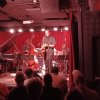



 Buy Now
Buy Now




